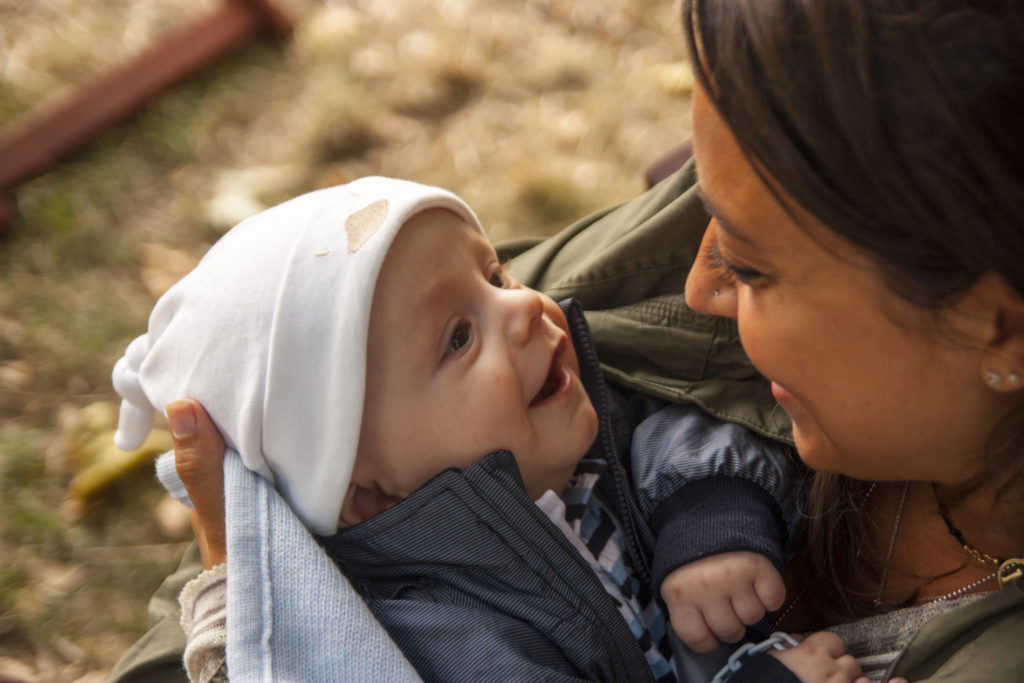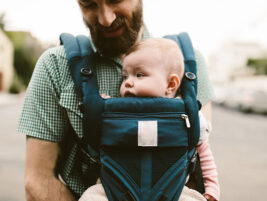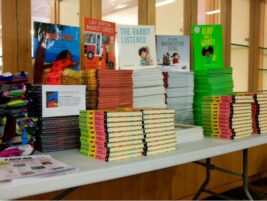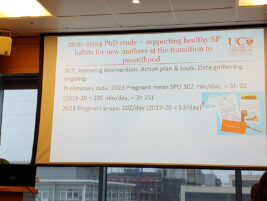I have been working as a Social Worker with children and their families for the last eighteen years. In 2006 I attended an Infant Mental Health Master Class facilitated by Deborah Weatherston of the Michigan Association of Infant Mental Health and Catherine Maguire and Rochelle Matacz of the Cork Health Health Services. I, along with other members of my team, have been involved in an Infant Mental Health Network Group since then. A central feature of the infant mental health model is reflective supervision. “ Most IMH specialists learn to use the supervisory relationship to reflect on the complex emotional realities of overburdened families and infants at risk. ….. The IMH specialist may be affected deeply by individual infants and families ..she needs to have time to discuss what is seen and heard” (Weatherston, 2000, p.9).
In 2009 I completed a Postgraduate Diploma in Advanced Fieldwork Practice and Supervision in University College Cork, Ireland. As a participant of this course I was expected to keep a learning journal, and to engage in a process of reflective learning. I was also a member of a peer group which met regularly to provide members with opportunities to engage in reflection. This reflective model of learning is set out in an article by Demspey et al, 2001. They make reference to the use of Kolb’s learning cycle, and Steve Seidel’s framework “which involves the learner in looking backward, looking inward, looking outward and looking forward.” The importance of reflective practice and supervision has been a recurring theme for me in my studies and in my work experiences and also in recent reports regarding social work with children and their families. Eileen Munroe talks about expertise in social work and how this is developed. She says: “Experience on its own is not enough. It needs to be allied to reflection – time and attention given to mulling over the experience and learning from it”. (Munroe, p.87).“The emotional dimension of working with children and families plays a significant part in how social workers reason and react. If it is not explicitly discussed and addressed then its impact can be harmful. It can lead to distortions in social workers’ reasoning because of the unconscious influence it has on where attention is focused and how information is interpreted.” (p.91)
In the current climate of limited resources, reduced access to training, and increasing pressure on managers we have to be creative in finding the space for reflection. As a social worker I receive regular supervision. However due to the demands of the service this mostly focuses on case management, with little opportunity for reflective space. This challenged me to look at my experiences of supervision and find a space for critical reflection, for on-going learning, and growth. This then led me to have discussions within my team about how we might look to providing each other with support and, as a result, improve the quality of service to the children and families we work with. It has been creative and collaborative effort.
What follows is an example of how members and I from my team drew on our own resources to create a reflective space. As a team we acknowledged the inherent complexity and uncertainty in the work we do and the emotional impact of it. We identified a need for a reflective space to help us gain a better understanding of our own experiences in practice, further developing our conscious awareness of the impact of our work, including the impact we have on service users. With support from University College Cork (UCC), members of the Department of Applied Social Studies Carmel Halton, Marion Murphy and Applied Psychology, Maria Dempsey we began negotiating around setting up Reflective Learning Groups in our team. They had previous involvement in introducing a model of peer reflective practice in a social work agency. (Dempsey et al, 2008). In May 2010 we had two such groups up and running. We meet monthly for 1 ½ hours. My experience of being involved in this group appears below:
I keep a learning journal. I write in this regularly about my practice experiences and issues that arise for me. I use this to reflect on the work I do, to bring to conscious awareness the feelings I have and to better understand the role they play in my relationships with service users. I use it to identify questions I have and to consider what I could do differently. The journal is then one of the means used of engaging in the reflective process in the group – having the opportunity to read aloud, to be listened to, and to be supported in exploring feelings, thoughts, actions through thoughtful and at times challenging questions from my peers. The group provides space for further reflection, for planning further action, for making connections between theory and practice.
So what works for me:
- The focus is on “I” – owning and taking responsibility for my thoughts, feelings and actions.
- Having the space to explore experiences, to bring into my conscious awareness the feelings and emotions I experience and consider the impact of these on my work and on service users
- The journal and the group provide me with support and structure to connect with the emotional impact of the work, and the impact of my relationships with service users. This helps me to better understand from what basis I am working and to keep the best interests of children and their families at the centre of my practice.
- As a result of the group I can make better use of formal supervision with my manager. I am clearer about the issues I need to bring to supervision.
The challenges:
- The process is not always easy – bringing together a group of people, negotiating ground rules, developing trust, being supportive rather than judgmental, giving and receiving authentic feedback.
- Continuing to find time within an increasingly pressured work environment to use the journal, and attend the meetings
Being part of such a group has been important to sustaining me in my work. It has enriched my engagement with service users and I believe has led to better decision making in the best interest of children.
The support we received initially from UCC was important in helping us establish and sustain the groups and to overcome the challenges in the first year. Now we manage the groups ourselves. We don’t always come up with the answers but generally are clearer about what the questions are. I believe this is a creative development in our team which has enhanced our practice and is a model which could be replicated to provide reflective space for practitioners working in social work teams.
References
Dempsey, M., Halton, C. & Murphy, M. (2001). Reflective learning in social work education: scaffolding the process. Social Work Education, Volume 20, No. 6, 631-641.
Dempsey, M., Murphy, M. & Halton,C. (2008). Introducing tools of reflective learning into peer supervision groups in a social work agency: An action research project. Journal of Practice Teaching and Learning, Volume 8, No. 2, 25-43.
Monroe, E. (2011). The Munro Review of Child Protection: Final Report – A child-centred system. The Stationery Office Limited.
Weatherston, D. (2000). The Infant Mental Health Specialist. Journal for Zero to Three, Vol 21, No. 3.
An Experience of Reflective Practice – Finding a Reflective Space
Authors
Bruen, Siobhán,
Social Worker,
Ireland








